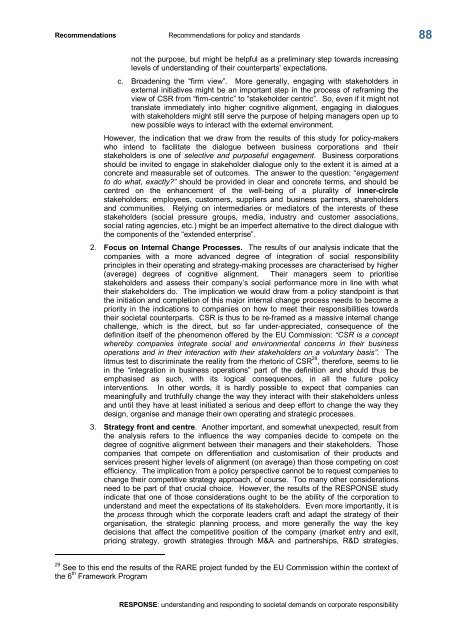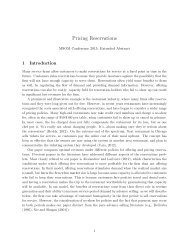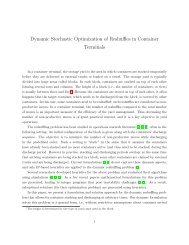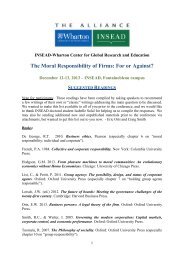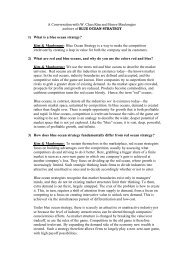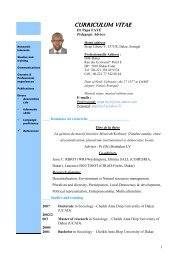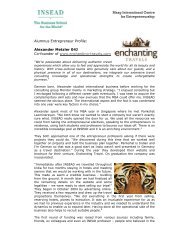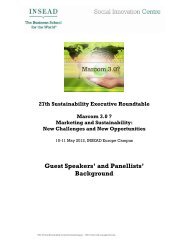RESPONSE - Insead
RESPONSE - Insead
RESPONSE - Insead
You also want an ePaper? Increase the reach of your titles
YUMPU automatically turns print PDFs into web optimized ePapers that Google loves.
Recommendations Recommendations for policy and standards<br />
not the purpose, but might be helpful as a preliminary step towards increasing<br />
levels of understanding of their counterparts’ expectations.<br />
c. Broadening the “firm view”. More generally, engaging with stakeholders in<br />
external initiatives might be an important step in the process of reframing the<br />
view of CSR from “firmcentric” to “stakeholder centric”. So, even if it might not<br />
translate immediately into higher cognitive alignment, engaging in dialogues<br />
with stakeholders might still serve the purpose of helping managers open up to<br />
new possible ways to interact with the external environment.<br />
However, the indication that we draw from the results of this study for policymakers<br />
who intend to facilitate the dialogue between business corporations and their<br />
stakeholders is one of selective and purposeful engagement. Business corporations<br />
should be invited to engage in stakeholder dialogue only to the extent it is aimed at a<br />
concrete and measurable set of outcomes. The answer to the question: “engagement<br />
to do what, exactly?” should be provided in clear and concrete terms, and should be<br />
centred on the enhancement of the wellbeing of a plurality of innercircle<br />
stakeholders: employees, customers, suppliers and business partners, shareholders<br />
and communities. Relying on intermediaries or mediators of the interests of these<br />
stakeholders (social pressure groups, media, industry and customer associations,<br />
social rating agencies, etc.) might be an imperfect alternative to the direct dialogue with<br />
the components of the “extended enterprise”.<br />
2. Focus on Internal Change Processes. The results of our analysis indicate that the<br />
companies with a more advanced degree of integration of social responsibility<br />
principles in their operating and strategymaking processes are characterised by higher<br />
(average) degrees of cognitive alignment. Their managers seem to prioritise<br />
stakeholders and assess their company’s social performance more in line with what<br />
their stakeholders do. The implication we would draw from a policy standpoint is that<br />
the initiation and completion of this major internal change process needs to become a<br />
priority in the indications to companies on how to meet their responsibilities towards<br />
their societal counterparts. CSR is thus to be reframed as a massive internal change<br />
challenge, which is the direct, but so far underappreciated, consequence of the<br />
definition itself of the phenomenon offered by the EU Commission: “CSR is a concept<br />
whereby companies integrate social and environmental concerns in their business<br />
operations and in their interaction with their stakeholders on a voluntary basis”. The<br />
litmus test to discriminate the reality from the rhetoric of CSR 29 , therefore, seems to lie<br />
in the “integration in business operations” part of the definition and should thus be<br />
emphasised as such, with its logical consequences, in all the future policy<br />
interventions. In other words, it is hardly possible to expect that companies can<br />
meaningfully and truthfully change the way they interact with their stakeholders unless<br />
and until they have at least initiated a serious and deep effort to change the way they<br />
design, organise and manage their own operating and strategic processes.<br />
3. Strategy front and centre. Another important, and somewhat unexpected, result from<br />
the analysis refers to the influence the way companies decide to compete on the<br />
degree of cognitive alignment between their managers and their stakeholders. Those<br />
companies that compete on differentiation and customisation of their products and<br />
services present higher levels of alignment (on average) than those competing on cost<br />
efficiency. The implication from a policy perspective cannot be to request companies to<br />
change their competitive strategy approach, of course. Too many other considerations<br />
need to be part of that crucial choice. However, the results of the <strong>RESPONSE</strong> study<br />
indicate that one of those considerations ought to be the ability of the corporation to<br />
understand and meet the expectations of its stakeholders. Even more importantly, it is<br />
the process through which the corporate leaders craft and adapt the strategy of their<br />
organisation, the strategic planning process, and more generally the way the key<br />
decisions that affect the competitive position of the company (market entry and exit,<br />
pricing strategy, growth strategies through M&A and partnerships, R&D strategies,<br />
29 See to this end the results of the RARE project funded by the EU Commission within the context of<br />
the 6 th Framework Program<br />
<strong>RESPONSE</strong>: understanding and responding to societal demands on corporate responsibility<br />
88


